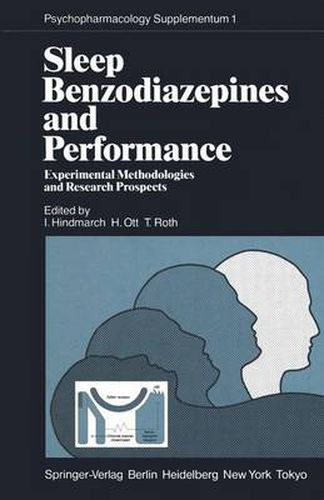Readings Newsletter
Become a Readings Member to make your shopping experience even easier.
Sign in or sign up for free!
You’re not far away from qualifying for FREE standard shipping within Australia
You’ve qualified for FREE standard shipping within Australia
The cart is loading…






This title is printed to order. This book may have been self-published. If so, we cannot guarantee the quality of the content. In the main most books will have gone through the editing process however some may not. We therefore suggest that you be aware of this before ordering this book. If in doubt check either the author or publisher’s details as we are unable to accept any returns unless they are faulty. Please contact us if you have any questions.
The following papers were presented at an International Workshop on experi mental methodologies and research strategies in sleep, benzodiazepines and per formance during the VII. International Congress of Psychiatry in Vienna 1983. Authors were asked to examine and review the methods used and the results obtained from the various studies within their particular expertise and to provide guidelines for future strategies in the psychopharmacology of sleep. It has long been felt by sleep researchers, psychopharmacologists and clini cians that the effects of drugs on sleep or even sleep itself cannot be evaluated without reference to the daytime behaviour of the individual. Sleep and daytime performance are complementary aspects of the same circadian cycle. The modifi cation of sleep parameters by hypnotic medication must necessarily have an impact upon daytime behaviour. The overall change in a patient’s daytime behaviour following nocturnal administration of a benzodiazepine is of importance when considering the toler ability and safety of the drug in clinical use. Alterations to the integrity of daytime performance also have consequences for that patient’s subsequent sleep and nocturnal behaviour. Thus this workshop was conceived as a platform for examining the inter relationship of sleep, benzodiazepine hypnotics and daytime performance from pharmacological, psychological, experimental and clinical standpoints. The fol lowing papers also highlight the complexity of the interaction between sleep, patient, drug and daytime performance and emphasize the need to approach problem areas with appropriate research strategies and experimental method ologies.
$9.00 standard shipping within Australia
FREE standard shipping within Australia for orders over $100.00
Express & International shipping calculated at checkout
This title is printed to order. This book may have been self-published. If so, we cannot guarantee the quality of the content. In the main most books will have gone through the editing process however some may not. We therefore suggest that you be aware of this before ordering this book. If in doubt check either the author or publisher’s details as we are unable to accept any returns unless they are faulty. Please contact us if you have any questions.
The following papers were presented at an International Workshop on experi mental methodologies and research strategies in sleep, benzodiazepines and per formance during the VII. International Congress of Psychiatry in Vienna 1983. Authors were asked to examine and review the methods used and the results obtained from the various studies within their particular expertise and to provide guidelines for future strategies in the psychopharmacology of sleep. It has long been felt by sleep researchers, psychopharmacologists and clini cians that the effects of drugs on sleep or even sleep itself cannot be evaluated without reference to the daytime behaviour of the individual. Sleep and daytime performance are complementary aspects of the same circadian cycle. The modifi cation of sleep parameters by hypnotic medication must necessarily have an impact upon daytime behaviour. The overall change in a patient’s daytime behaviour following nocturnal administration of a benzodiazepine is of importance when considering the toler ability and safety of the drug in clinical use. Alterations to the integrity of daytime performance also have consequences for that patient’s subsequent sleep and nocturnal behaviour. Thus this workshop was conceived as a platform for examining the inter relationship of sleep, benzodiazepine hypnotics and daytime performance from pharmacological, psychological, experimental and clinical standpoints. The fol lowing papers also highlight the complexity of the interaction between sleep, patient, drug and daytime performance and emphasize the need to approach problem areas with appropriate research strategies and experimental method ologies.